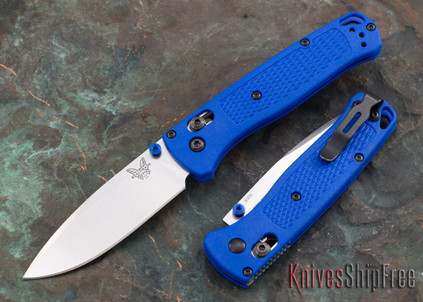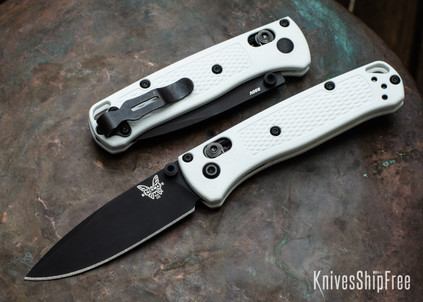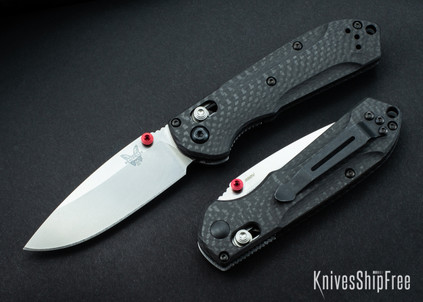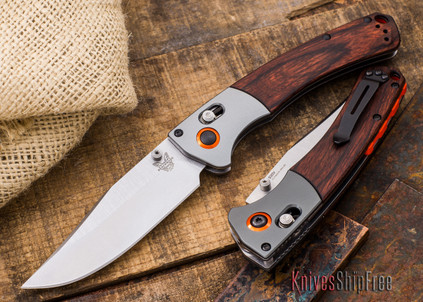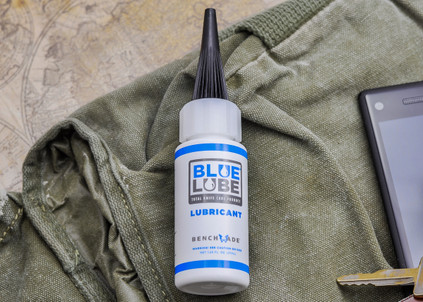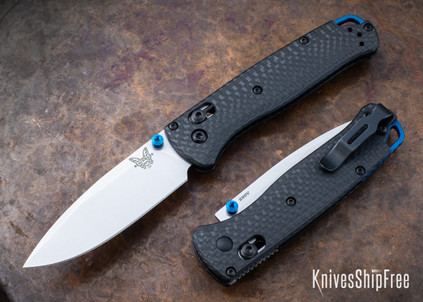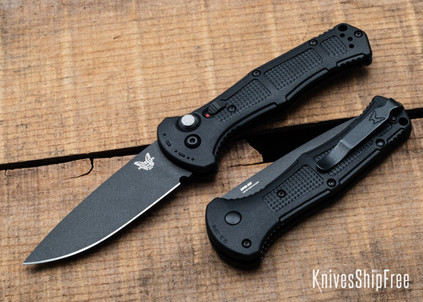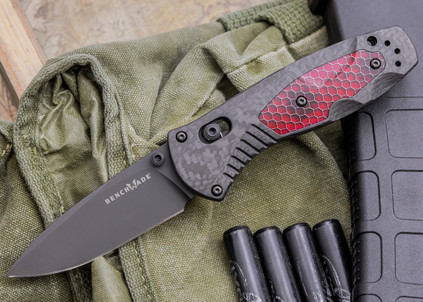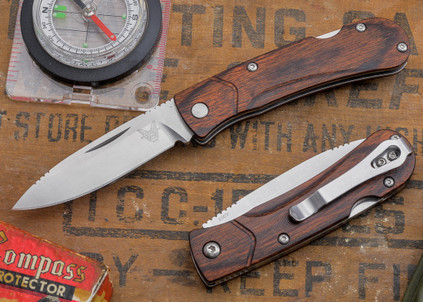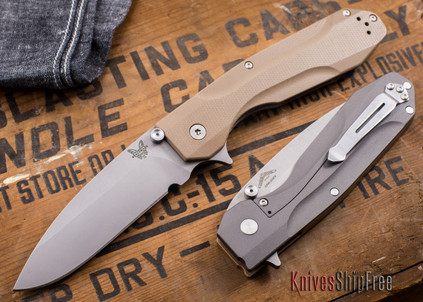About Benchmade
In 1988, the knife industry paid little attention to a small startup company named Benchmade. It started by making butterfly knives, but eventually people began to take notice of its innovation -- and its pocket knives.
Today, Benchmade is a pioneer in the industry. It utilizes the finest folding knife materials to produce the best blade possible.
The Axis Lock mechanism is an iconic part of Benchmade's lineup, but the knife innovation doesn't stop there. The company experiments with blade steels, handle materials, and high quality, US-based machining centers to create finished products unlike anything else out there, backed by LifeSharp, a legendary lifetime warranty service for every knife that leaves their factory.
As Benchmade grows, it continues push to its knife designs in new directions. The in-house team is creative and bold, and Benchmade also teams up with custom knife makers for fresh new products.
The best recommendation of these knives is that when people come into our store and ask me to suggest a modern EDC knife, I point to Benchmade -- always.
Whether you're looking for your first Mini Griptilian or adding the latest Gold Class knife to your collection, KnivesShipFree has you covered. All of our knives are in stock and ready to ship.
Lifetime Warranty
"Each new Benchmade knife is packaged with written documentation of the Benchmade Limited Lifetime Warranty. Benchmade Knife Company, Inc. warrants that Benchmade knives purchased from authorized dealers will be free from defects in materials and workmanship. Benchmade will, without charge, repair or replace at our (Benchmade's) option, any knife purchased from an authorized dealer and returned for Warranty work that is found to be defective by Benchmade."
Visit Benchmade's warranty page for more information and instructions.
LifeSharp Service

Not only does Benchmade offer US-made products with a lifetime warranty, but they will also service your knife for free should you ever need it. All you need to do is send the knife to Benchmade following their instructions, and they will gladly perform all of these services:
- Clean
- Oil
- Adjust
- Re-sharpen
Visit Benchmade's LifeSharp page for more details and instructions.
*Service does not apply to any serrated portion of the blade.
Where are Benchmade Knives made?
All Benchmade Knives are proudly made in the United States of America. Benchmade Knife Company is headquartered in Oregon City, Oregon.
How strong is Benchmade's AXIS Lock mechanism?
It's hard to beat the patented AXIS lock from Benchmade -- it's definitely one of our favorite mechanisms. Once it's engaged, the blade's tang wedges solidly between a a beefy stop pin and the AXIS bar. Plus, the mechanism is also ambidextrous and lets us "flick" the blade open and closed.
Anyone who doubts the strength of the AXIS mechanism should watch this video (below) of Benchmade's own lab test of the 275 Adamas folder. Prepare to be impressed.
Now to be clear, we never put a locking folder to work without first acknowledging that it's still a folding knife -- or, as fixed-blade aficionados like to say, "a knife that's pre-broken in the middle." No mechanism is perfect, and a folder will never match the strength of a fixed blade.
Still, if a folding knife is the right tool for the job (or when that's what we happen to have at the time), the Benchmade AXIS Lock has our absolute confidence.
What should I use to lubricate the pivot of my folding knife?
Most any folding knife, whether it's a multi-blade pocketknife or a single-blade folder, will benefit from a bit of oil on the pivots from time to time.
Over the years we've used light machine oil, gun oil and various household oils, but the best product we've found for maintaining our folding knives' pivots is Benchmade BlueLube.
Whatever you decide to use, don't over-lubricate -- a drop or two is all you need. Anything more will only attract dirt and gritty particles that'll eventually cause wear.
Here's another tip: During your new knife's break-in period, don't lubricate it.
The pivots of folding knives are lubricated when they're assembled -- with oil, light grease or graphite powder -- and the maker applies only a small amount of lubricant, to avoid interfering with normal break-in.
We know it can be tempting, with a new knife that's stiff or sticky, to apply oil to the pivot immediately. That may soften the action, but it'll also postpone (or prevent) the break-in process.
Be patient. Let the surfaces "mate" naturally. When you notice your knife begin to become smoother, then you can add a drop or two of light oil.
Can I change the position of the pocket clip on my Benchmade knife?
Yes, if your particular Benchmade knife allows for it.
Some (but not all) Benchmade models accommodate more than one position for the pocket clip, allowing either left- or right-handed carry, as well as tip-up or tip-down carry. Take a look at the current position of the clip on your Benchmade, along with the way it attaches, and then look for vacant holes in a matching pattern at the other end of the handle (and on the opposite side).
You'll need a Torx driver to remove (and re-insert) the screws securing the clip to the knife. (We recommend Benchmade's Blue Box Toolkit for this.) Remove the screws holding the clip in place, move it to the new position and replace the screws.
Consider applying a drop of thread-locking compound (blue Loctite, for example) to each screw. Whatever you do, don't over-tighten the screws.
At some point, of course, you may decide to remove the pocket clip and leave it off, and that's fine -- it won't affect your knife's function. Put the clip and the screws in a plastic bag in case you change your mind and want to put the clip back later. Don't thread the screws back into your knife's handle "for safekeeping," however -- without the clip, the screws will go farther into the handle, which could scratch the blade or interfere with its function.
How do I adjust the pivot on my Benchmade knife?
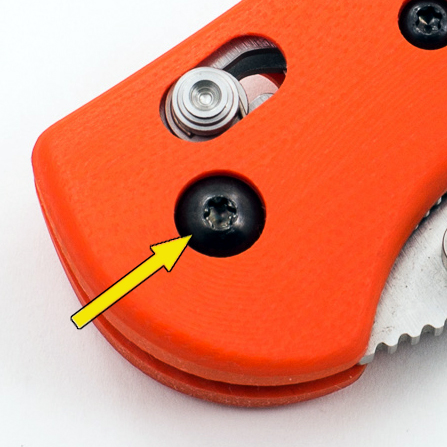
On almost every Benchmade folding knife you'll find an adjustable pivot. You can loosen or tighten the pivot screw (right) with a Torx driver, setting the knife's action to your liking.
It's a great feature -- the way we see it, anything that lets you personalize a knife is a plus.
The goal, of course, is to find the "sweet spot." Exactly where that is will depend on your personal preferences. The trick to getting it just right is a matter of making a slight adjustment, living with it for a while, and then (if need be) fine-tuning the tension 'til it suits you.
Just be careful -- you don't want the pivot so loose that the blade flops open in your pocket. On the other hand, over-tightening the pivot can make the knife downright unusable, and it causes premature wear.
(Don't have a Torx driver? We recommend the Benchmade BlueBox tool kit.)
When your knife is new...
A folding knife is a mechanical device, so its contact surfaces take time to "mate" -- regular action "polishes" the surfaces smooth. During the natural break-in period, you may want to wait a while before adjusting the pivot.
Right out of the box, a new folder might seem tight (or tighter than you'd like), but chances are it simply needs some use to operate smoothly. You don't want to loosen the pivot screw to "fix" a problem that doesn't exist, and you'd only be delaying normal break-in.
We urge you to resist adjusting the pivot right away. Give your new Benchmade some time to break-in naturally before messing with the tension of the pivot. In the long run it'll be worth the wait.
(For more information, check out our primer on the break-in period for folding knives.)

